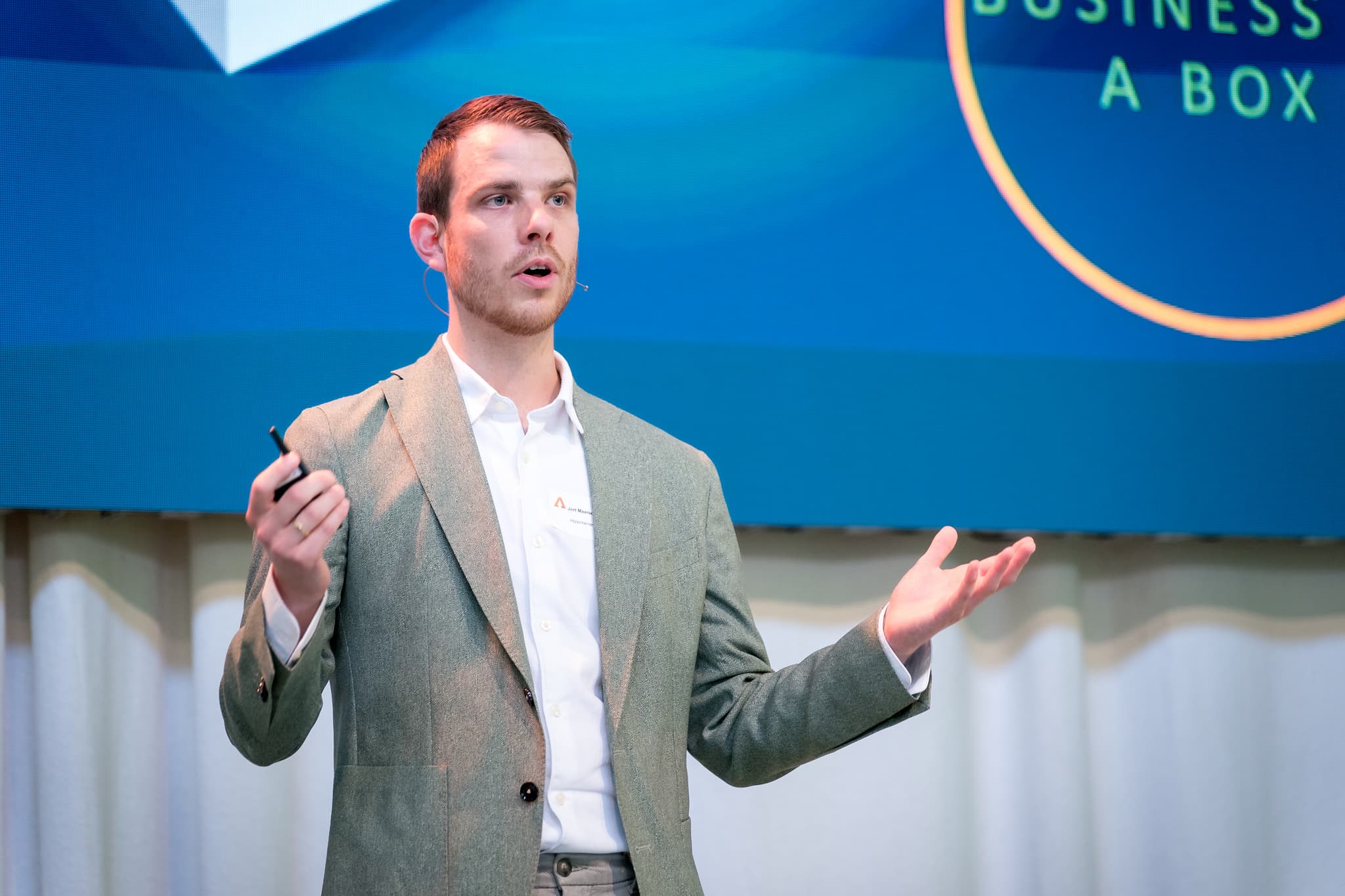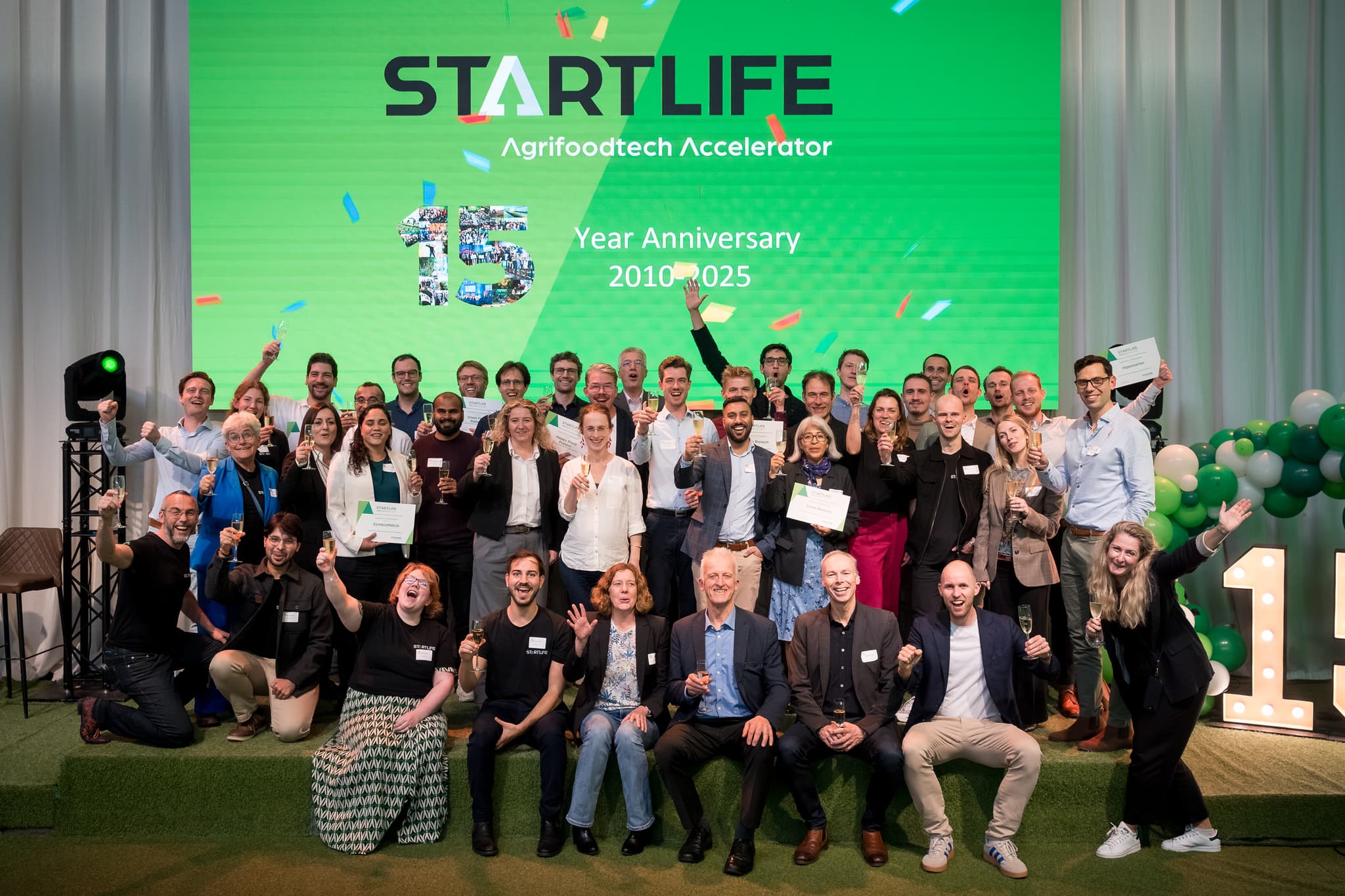Hippotainer: Fresh food, anywhere on Earth
This Dutch startup builds container-based farming systems to fight food insecurity, from Ukraine to remote islands.
Published on November 10, 2025

Jort Maarseveen, Hippotainer
Bart, co-founder of Media52 and Professor of Journalism oversees IO+, events, and Laio. A journalist at heart, he keeps writing as many stories as possible.
At StartLife’s 15th anniversary celebration in Ede, eleven pioneering agrifoodtech startups took the stage to show how science and entrepreneurship can reshape the future of food. From smarter biostimulants and energy-efficient farming robots to next-generation proteins and nutrient innovations, each team presented a bold solution to one of the world’s most urgent challenges: feeding a growing population within planetary limits. In this IO+ series, we highlight their stories; not just the technologies they’re building, but also their vision and the advice they received from the expert panels. Today, we focus on Hippotainer.
When Jort Maarseveen, CEO of Hippotainer, stepped onto the stage at StartLife’s Demo Day, he didn’t begin with technology or business models. He began with a number that made the audience pause. “More than 2.3 billion people are food insecure right now,” he said. “They either have no access to food, no availability, poor quality diets, or unstable food supplies. And beware, someone who is food secure today might not be tomorrow, because of climate change, or war.”
Then he asked the question that drives his company: What if we could produce fresh food, anywhere in the world?
That vision — bold, simple, and deeply pragmatic — is what led to the Hippotainer, a fully functional food production system built inside a 40-foot shipping container.
Farming in a box
Inside the steel walls of a standard container, Hippotainer integrates hydroponic growing systems, lighting, climate control, and digital monitoring, creating a portable micro-farm that can operate year-round, independent of weather or location. “It’s a complete food production system,” Maarseveen said. “We can enable anyone, anywhere, to grow food; not just leafy greens, but a wide variety of crops.”
The idea was born out of Wageningen, the Dutch epicenter of agrifood innovation, but its first test took place far from the Netherlands, in war-torn Ukraine. “We trained a group of local refugees to use our product,” Maarseveen explained. “They now produce vegetables for their local community, while generating income for their families.”
The pilot proved that even under the harshest conditions - disrupted infrastructure, energy scarcity, and economic instability - Hippotainer could deliver real impact. “After such a successful pilot,” he said, “we are ready to go to market.”
From conflict zones to remote islands
Hippotainer’s technology is designed for versatility. It can serve as a humanitarian tool in conflict areas, but also as a long-term solution for remote or import-dependent regions. “Our beachhead market is remote islands,” Maarseveen said. “Places that are 100% dependent on food imports. Everything, even fresh vegetables, has to be shipped or flown in.”
These islands, he added, often depend on tourism, where demand for high-quality produce is strong, but supply chains are fragile. “A ship or container filled with vegetables has to leave the island empty,” he explained. “That means double transportation cost. Prices for local vegetables are extremely high. We can offer a better, more stable solution; fresh produce grown right where it’s consumed.”
The company’s first demonstration unit will soon be placed on Wageningen Campus, where visitors can see the system in action. At the same time, new projects are already confirmed: two more containers for Ukraine in early 2026, and a pilot on a remote island.
A simple idea with complex reach
Maarseveen’s pitch earned warm applause, not just for its humanitarian ambition but for its market potential. Still, the challenges ahead are real. “Our focus on remote islands makes perfect sense,” he told the panel. “But these locations are, by definition, hard to reach. We’re looking for creative ways to find and connect with our customers.”
The panelists responded with a mix of curiosity and encouragement. One asked, “What exactly is the pain point you’re solving? Do island customers want Western vegetables, or just fresh produce at all? What are the alternatives, and at what price?”
Maarseveen answered without hesitation: “Some of these islands produce nothing at all. They rely entirely on imports. Our system can replace that dependency and reduce transport costs. It also offers food security when supply chains are disrupted.”
Closer than it seems
One of the experts on stage suggested that Hippotainer’s market might be nearer than it thinks. “Why not start with the Caribbean islands of the Kingdom of the Netherlands?” she proposed. “They face exactly the same problem: they import almost everything.”
Others pointed to humanitarian opportunities. “There are war zones and refugee areas where the UN or international NGOs could be key partners,” one panelist said. “Those organizations are based in Europe. You might not need to go far to reach them.”
Another suggested that Hippotainer should define its customer persona more precisely. “Is your buyer a government, a retailer, a hotel chain, or an aid organization?” he asked. “Once you know that, you can design your message and your pricing much more effectively.”
Beyond food: Building resilience
As the discussion unfolded, one panelist posed a deeper question: “Are you a food security company or a supply chain resilience company?” The distinction, he argued, determines both the business model and the investor profile.
Maarseveen acknowledged the point. “That’s exactly the question we’re exploring now,” he said afterward. “We started by focusing on food insecurity, but what we’re really building is resilience. It’s about giving communities the ability to feed themselves, no matter what happens around them.”
Growing hope
For now, Hippotainer is seeking investors and partners to scale its production. The team, a multidisciplinary group of engineers, agronomists, and designers, remains based in Wageningen but operates with a global mindset.
The mission, Maarseveen emphasized, goes far beyond technology. “We want to make fresh food accessible everywhere,” he said. “Because whether you’re on a remote island, in a refugee camp, or in a war zone, everyone deserves the dignity of good food.”
In a world facing growing instability, perhaps the future of farming really does come in a box.

15 years Startlife
Read about all the startups that were part of StartLife’s 15th anniversary Demo Day.
